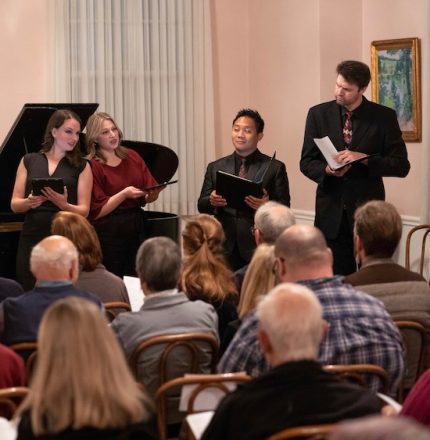Fourth Coast Ensemble fetes American women in Evanston

For musicians, the ability to program a lively concert may not be as indispensable as learning to navigate an Elliott Carter string quartet or a Verdi aria. But from an audience standpoint, it’s vital. It can mean the difference between an evening that simply reinforces what we already know and one that takes us to new territory worth exploring.
Since its inception in 2013, the enterprising vocal quartet Fourth Coast Ensemble has focused on horizon-expanding programming. Their concert Thursday night in the music room of the Woman’s Club of Evanston offered the best kind of musical journey to parts unknown. Titled “American Woman,” it included songs by American female composers ranging from the roiling romanticism of Amy Beach to the pointillistic, mysterious harmonies of Ruth Crawford Seeger.
And best of all, the program, to be repeated Saturday at Hyde Park’s Church of St. Paul and the Redeemer, wore its thematic mantle lightly. This year marks the 100th anniversary of ratification of the 19thAmendment giving American women the vote.
What better way to celebrate than to perform songs by American women? And include songs set to texts by Susan B. Anthony and the words of the 19th Amendment itself. And to sing them in a club founded 130 years ago for and by women concerned about social problems in their community. With that kind of thoughtful but uncontrived theme, the performance felt as spontaneous and buoyant as a beloved aunt’s birthday party.
The evening’s highlight was the Chicago premiere of Are Women People?, a cycle of eight songs for vocal quartet by Lori Laitman. Laitman’s songs, four performed a cappella, are essentially tonal and lyrical, but harmonies are often slightly off-center and her rhythms syncopated and unpredictable. Four songs are performed a cappella, the rest with piano-four-hand accompaniment.
The cycle, whose title comes from a 1917 poem by suffragette Alice Duer Miller, covers bracingly varied emotional terrain. In “A Suggested Campaign Song,” the mood was deliriously uptempo, driven by the pianists (Andrew Rosenblum and Maria Sumareva) stomping through a waltz with all the subtlety of a brass band at the circus. The words, however, were incongruously non-confrontational. Sung by bright-voiced soprano Sarah van der Ploeg and mezzo-soprano Bridget Skaggs, these suffragettes proudly outed themselves as well-bred ladies. “A campaign so calm and still,” they declaimed. “We never speak for print.” The men, robust tenor Ace Gangoso and commanding bass-baritone David Govertsen, echoed the women’s phrases with hearty approval. As male and female voices tumbled vigorously over one other, however, we began to wonder exactly who was setting the agenda, the self-satisfied men or the savvy women?
In the quieter “Relic,” set to a text by Susan B. Anthony the a cappella quartet’s overlapping phrases and thoughtful pauses conveyed the weariness of a long-fought battle not yet won. Throughout the cycle, the singers’ voices bounced off one another in more dissonant sections and blended with velvety ease in more traditional harmonic passages.
Van der Ploeg brought ringing intensity to another Chicago premiere, This Arc Towards Justice, a 2013 work by Andrea Clearfield for soprano, alto saxophone (J. Michael Weiss-Holmes) and piano. Set to a text by Angelique V. Nixon about America’s failure to fulfill Dr. Martin Luther King’s dreams, it was both stirring and disquieting. The interplay between the saxophone’s deep, smooth, room-filling tone and Rosenblum’s somber piano was a powerful counterpoint to van der Ploeg’s leaner, urgent vocal line. Clearfield’s repeated short, rocking phrases vividly illustrated the exhausting starts and stops of the country’s decades-long struggle for social justice.
Skaggs was a compelling force in two Jake Heggie songs for mezzo-soprano, flute (Marie Micol Bennett) and piano set to poems by Sir Helen Prejean. (Heggie’s opera about Sister Helen’s battle against the death penalty, Dead Man Walking, is currently onstage at Lyric Opera.) A gifted actress, Skaggs has an agile, expressive voice whose dark shadows and clear upper register were equally at home in the songs’ meditative moments and more ecstatic flurries.
The program will be repeated 7:30 p.m. Saturday at the Church of St. Paul and the Redeemer in Hyde Park. fourthcoastensemble.com.
Posted in Performances

